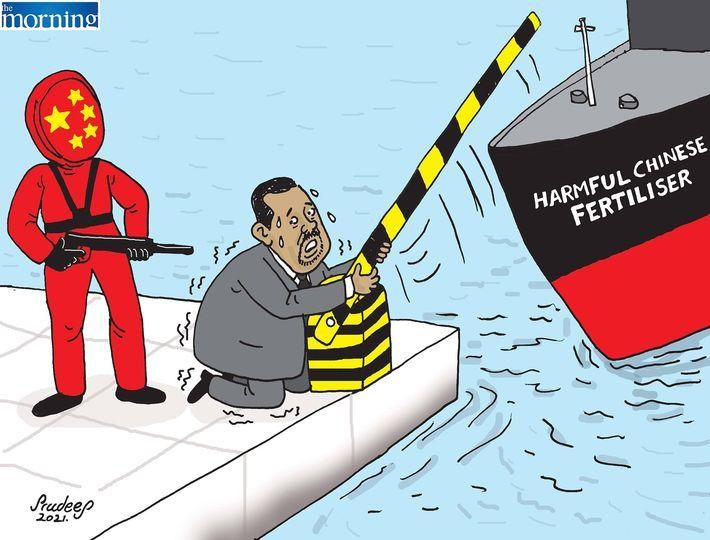Following requests from China, the Government has agreed to send the organic fertiliser samples from the China-based Qingdao Seawin Biotech Group Co. Ltd., which have been found to contain harmful bacteria on two previous occasions, to a third party and to retest their quality.
Promoting the Production and Regulating the Supply of Organic Fertiliser, and Paddy and Grains, Organic Foods, Vegetables, Fruits, Chillies, Onion, and Potato Cultivation Promoting, Seed Production, and Advanced Technology Agriculture State Minister Shasheendra Rajapaksa told the media yesterday (26) that China had refused to accept the results of the tests conducted so far.
“They (China) said that the tests carried out on these fertiliser samples by the local agencies could not be accepted as they were not accredited laboratories. They said that this company in question manufactures fertilisers for about 16 countries, including Australia, Canada, and the US, and therefore asked us to understand the quality of these fertilisers.”
Accordingly, Rajapaksa said that the Government had agreed to refer these fertiliser samples to a third party laboratory in order to ascertain their quality.
He made these remarks when the media questioned him regarding a meeting which is said to have been held between the Chinese Embassy in Sri Lanka and the local agricultural authorities on the matter.
Following tests carried out by local testing agencies, including the National Plant Quarantine Service (NPQS), on the second set of samples of organic fertiliser made in China that have confirmed the presence of harmful bacteria in the said samples, the Agriculture Ministry recently decided not to import organic fertiliser from the said company.
In this background, it was reported last week that the ship “Hippo Spirit”, carrying 20,000 metric tonnes (MT) of organic fertiliser from China, had informed certain local authorities that it would arrive at the Colombo Port last Friday (22).
The Chinese Embassy in Sri Lanka on an earlier occasion claimed that the recent decision to suspend the import of organic fertilisers from the aforementioned Chinese company to Sri Lanka is problematic. However, last Sunday (24), the Embassy told The Morning that it has no information regarding the arrival of the said ship. A spokesman for the Embassy said: “I have no information about it. It is just a commercial arrangement and the Embassy therefore has no information.”
When inquired about the ship, Rajapaksa stated that it had been made clear that it would not be allowed into Sri Lanka. “The ship will be sent back and we have directly told them (the relevant Chinese authorities) not to bring it.”
Recently, it was reported that a tender has been awarded to import 99,000 MT of organic fertiliser made in China, and that its value is approximately $ 63 million. It was also reported that the stock of fertiliser could contain harmful microorganisms, pathogens, and even diseases harmful to the soil, plants, and humans.
A letter sent to the Fertiliser Secretariat by the NPQS on the test results of the first set of samples, which was seen by The Morning, stated that both fertiliser samples they received contained harmful bacteria. According to the letter, the samples have been subjected to standard microbiological tests to find out whether they are contaminated with culturable microorganisms. Accordingly, the letter sent by the NPQS read: “Sample was found to be highly contaminated with gram positive and gram negative bacteria. Preliminary studies revealed the bacteria to be Bacillus spp and Erwinia spp, which can be pathogenic to plants. The other was found to be contaminated with gram positive bacteria, which is also a Bacillus spp.” Therefore, the samples submitted for laboratory investigation are not sterilised, the NPQS concluded in the letter.
Meanwhile, Ceylon Fertiliser Company Ltd. (CFC) has obtained another interim order from the Colombo Commercial High Court against the Chinese company, which shipped fertiliser containing harmful bacteria to Sri Lanka, its local agent, and People’s Bank.
In a press release issued yesterday, the President’s Media Division (PMD) stated that this court order prevents the payment to the Chinese firm on letter of credit (LC).
The CFC first obtained an enjoining order last Friday against the Chinese firm in question, preventing People’s Bank from making any payment under a LC opened in favour of the Chinese company, Qingdao Seawin Biotech Group Co. Ltd.
The previous court order was also issued preventing the Chinese company and its local agent from receiving any payment under the LC.
State Counsel Sehan Soyza, Dr. Charuka Ekanayake, Deputy Solicitor General Nirmalan Wigneswaran, and Additional Solicitor General Susantha Balapatabendi PC appeared on behalf of CFC.
The court was informed that even though the Chinese company was required to ship sterile organic fertiliser under the tender contract, it had admitted in its shipping advice that the consignment may contain microorganisms, the PMD said further.
The NPQS had tested the sample sent to them and had confirmed the presence of organisms, including certain types of harmful bacteria.
The consignment is a partial shipment worth more than a billion rupees that was procured through a tender process initiated by the Ministry of Agriculture, the PMD added.


